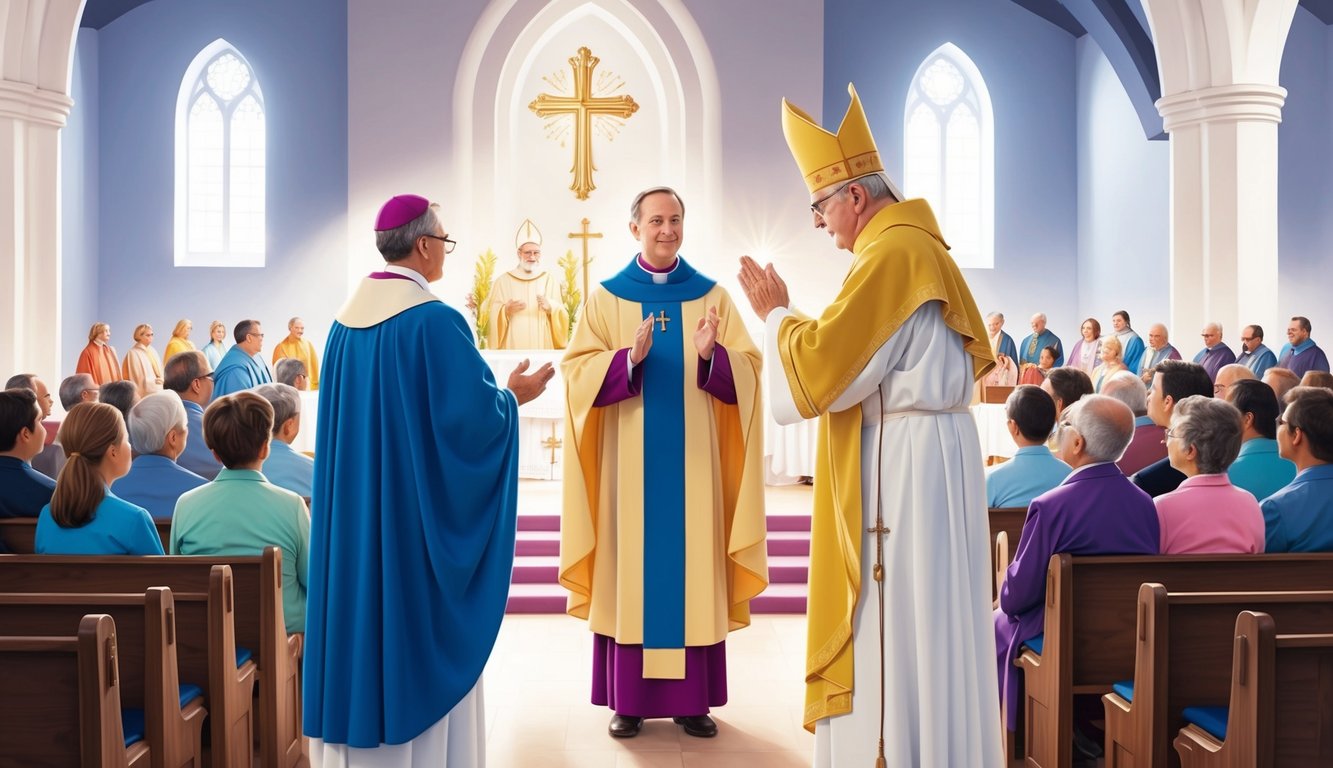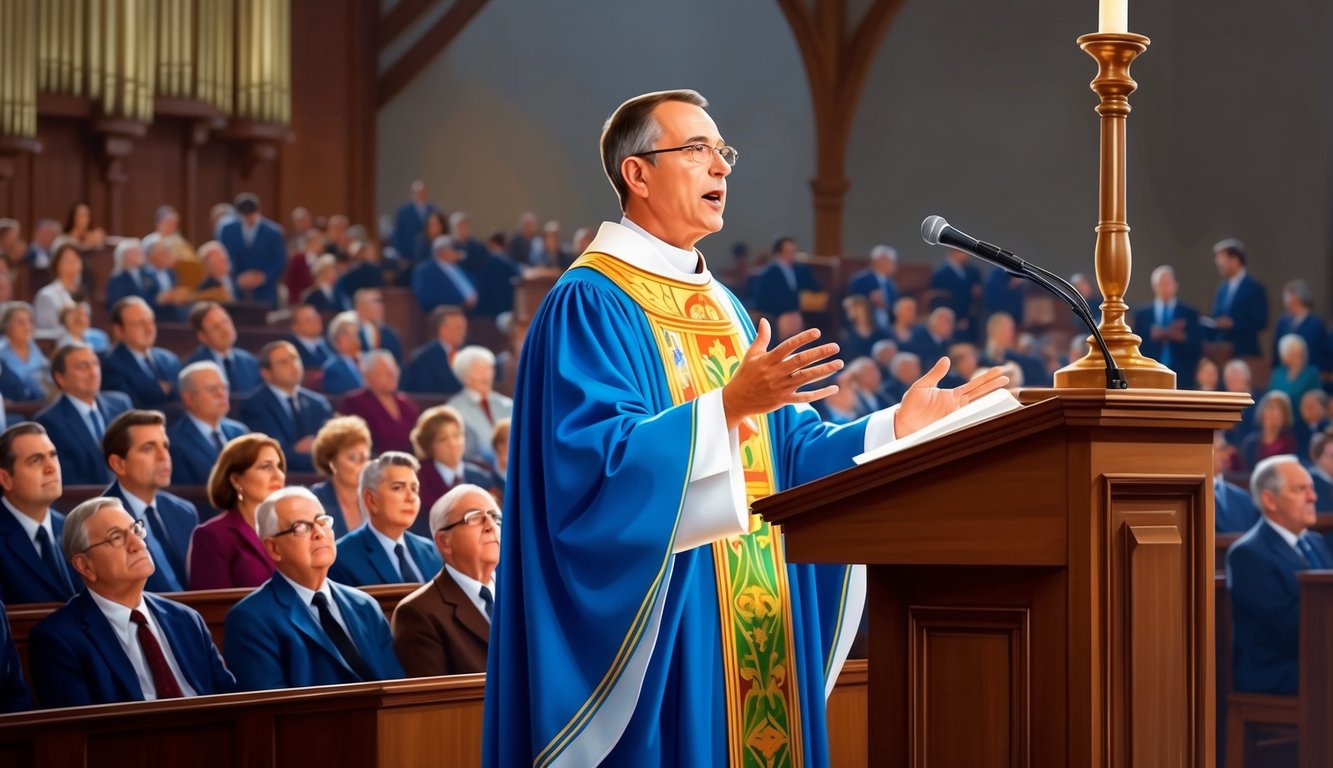Don’t Miss Out On This Unique Astrological Opportunity
Are you tired of spinning your wheels and getting nowhere? Simply put, you’re out of sync: you’re out of alignment with your astral configuration.
But: there’s a kind of map that can help you reclaim your alignment. Think of it as your own personal blueprint to success and happiness: a blueprint that will help you live your most amazing life.
Get started here.
In many churches, deacons play a vital role in supporting the ministry and serving the community.
A deacon is often seen as a bridge between the clergy and the congregation, providing practical help and spiritual guidance.
While their specific duties can vary depending on the church and denomination, deacons generally assist with worship services, visit the sick, and coordinate community outreach programs.
The role of deacons has deep historical and biblical roots.
In the early Christian church, deacons were responsible for distributing food to those in need and assisting with administrative tasks.
This foundation emphasizes the deacon’s connection to service and ministry, which remains a core aspect of their responsibilities today.
Understanding the nature of their work helps to appreciate their contributions to the church community.
When you encounter a deacon, you’ll find someone who has been ordained to serve.
This ordination is a significant step in affirming their commitment to the church and its mission.
Each deacon brings a unique blend of skills and dedication, making them an essential part of church life.
Whether through leading committees or providing pastoral care, deacons enhance the church’s ability to reach out and support its members and community.
Key Takeaways
- Deacons serve as a bridge between the clergy and congregation.
- They have historical roots in providing service and ministry.
- Ordination confirms their commitment to the church’s mission.
Historical and Biblical Foundations
Understanding the role of a deacon involves looking at both its origins in the early church and its development through history.
This section explores the roots of the diaconate from the Bible and early Christian texts to their evolution over the centuries.
Origins in the Early Church
The concept of a deacon is first introduced in the New Testament, most notably in Acts 6.
Here, the apostles appoint seven men to address practical needs within the community, allowing them to focus on prayer and preaching.
Stephen is one of these first deacons and later becomes the first Christian martyr.
The term deacon comes from the Greek word diákonos, which means servant.
Paul also mentions a deaconess named Phoebe in Romans 16:1, highlighting the important role women played in early Christian service.
Deacons were responsible for tasks like helping in the distribution of Holy Communion and assisting in charitable activities.
Development Through Church History
Over time, the role of deacons evolved significantly across different branches of the Christian Church.
In the early church, deacons served not only in administrative roles but also in liturgical and sacramental functions.
They assisted bishops in caring for the poor and sick.
The Catholic Church formally recognized the importance of deacons during the Second Vatican Council.
This led to a restoration of the permanent diaconate, allowing men, including married ones, to serve as permanent deacons.
In some traditions, deaconesses also served, although their role varied.
Today, deacons participate in sacraments like ordination and are considered crucial to the Church’s mission in a variety of cultures and settings.
The Role and Function of Deacons
Deacons play a vital role in religious communities, taking on numerous responsibilities.
Their work involves liturgical duties, community service, and pastoral care, each crucial to maintaining the spiritual and practical wellbeing of the congregation.
Liturgical Responsibilities
In liturgical contexts, deacons serve by assisting during services, including the Eucharist and Mass.
You may also witness them serving as an acolyte, helping to prepare sacraments like baptism and marriages.
Deacons often deliver the homily, proclaiming the Word of God and supporting the liturgy.
Deacons can also act as lectors, reading biblical texts during services.
Their involvement emphasizes the importance of teaching and spreading the Gospel to the faithful.
These roles within religious services require a deep sense of duty and devotion.
In many churches, deacons may also assist in distributing the Eucharist, further highlighting their service to the community.
Their responsibilities vary across denominations, reflecting the unique Christian traditions worldwide.
Through these roles, deacons help foster a deeper connection between the congregation and the teachings of Scripture.
Service to the Community
Deacons actively engage in charitable work and service to the community.
You will find them providing assistance to the poor, visiting the sick, and conducting acts of charity.
Their mission often includes organizing community resources and events to support those in need.
Service and assistance within the community extend beyond material help.
By helping organize outreach programs and leading prayer meetings, deacons work to inspire and uplift the community’s spiritual well-being.
They often collaborate with elders to address the needs of the congregation, ensuring no one is overlooked.
Pastoral Duties
The pastoral duties of a deacon involve providing care and support to members of the congregation.
Deacons offer pastoral care through visitation and engaging with those facing personal or spiritual issues.
Your interactions with a deacon may focus on individual guidance and spiritual counseling.
Deacons are equipped to conduct baptisms, bless gatherings, and lead prayers, acting as a bridge between pastors and the community.
They aim to support the pastors by alleviating some pastoral responsibilities.
This assistance enables deacons to nurture the congregation’s faith journey through personal interaction and community involvement.
Deacon Ordination and Life

Becoming a deacon involves a unique journey, with specific paths for married and single candidates.
Women also have significant roles in church life.
Each path includes distinct aspects related to ordination, vows, and service.
The Process of Becoming a Deacon
The journey to becoming a deacon involves several steps, starting with a call to serve.
You need to undergo a period of formation, which includes education in theology, liturgy, and pastoral ministry.
This formation often lasts several years, during which you will engage in both academic study and practical ministerial experience.
Ordination is the key step in this process.
You will participate in a special ceremony with prayers and vows, marking your commitment to the diaconate.
Once ordained, you will take on various roles, including assisting in liturgical services, performing baptisms, and supporting the priest and community.
Married and Single Deacons
In the Catholic Church, you can be ordained as a deacon even if you are married.
This is in contrast to the priesthood, where celibacy is usually required.
As a married deacon, you will be expected to balance your family life with church duties.
If you are single, celibacy is a requirement, highlighting your complete dedication to serving the Church.
The Vatican recognizes both permanent deacons, who remain deacons for life, and transitional deacons, who are on the path to priesthood.
Whether married or single, your primary role is to serve and support your local church.
It’s crucial to prioritize prayer and your sacramental duties while maintaining personal relationships and responsibilities.
The Role of Women
Although women cannot be ordained as deacons in the Catholic Church, they play vital roles in church life.
In some Christian denominations, women are ordained as deaconesses, taking on similar responsibilities.
These include helping the sick, teaching, and various forms of community support.
Women’s contributions to the church extend beyond formal roles.
Many women lead parish programs, engage in charitable activities, and offer spiritual guidance to others.
Although the debate on female ordination continues, the involvement of women remains an essential part of vibrant parish life.
Frequently Asked Questions

Deacons play essential roles in their churches and communities.
They assist in various ceremonies and have responsibilities that differ across denominations.
What are the responsibilities and duties of a deacon?
Deacons often support pastors in church activities.
They can help with administrative tasks, assist during worship services, and visit the sick or elderly in the community.
In some churches, deacons also manage charitable work and outreach programs, ensuring the needs of the congregation and local community are met.
Can deacons officiate marriage ceremonies?
In some Christian denominations, deacons can officiate marriage ceremonies.
This typically depends on the specific church guidelines and the local laws governing marriage ceremonies.
If you are considering having a deacon officiate your wedding, it is important to check with your church and local authorities.
How does the role of a deacon differ from that of a pastor?
While both deacons and pastors serve critical roles in the church, their responsibilities differ.
Pastors often lead the congregation through preaching and spiritual guidance.
Deacons, on the other hand, provide support to the pastor and tend to more practical needs, such as outreach and care for congregation members.
What qualifications are required to become a deacon?
The qualifications for becoming a deacon vary by denomination.
Generally, candidates must exhibit spiritual maturity and be active members of their church.
Some churches may require specific training or educational courses, while others might need a formal process of nomination and approval by church leaders.
In what ways do the functions of a deacon vary across different Christian denominations?
Different denominations have unique expectations for deacons.
For example, in some churches, deacons may focus primarily on service and charity, while others may also participate in liturgical roles.
Understanding the specific traditions and duties for deacons in each denomination can offer insight into their diverse responsibilities.
What is the scriptural basis for the role of a deacon?
The role of a deacon is grounded in Christian scripture, particularly in the New Testament.
The Book of Acts mentions deacons as important figures.
They were tasked with service roles within the early Church.
Passages like 1 Timothy 3 outline the moral and ethical qualities expected of deacons, underscoring their significance to church life.



